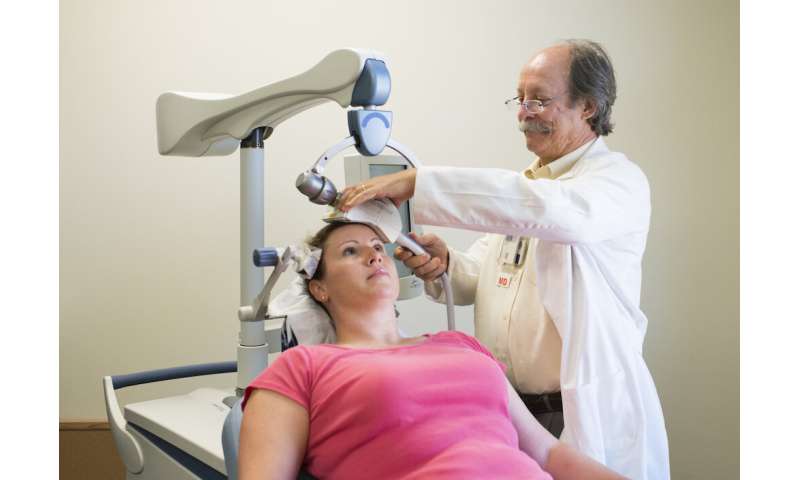
In a pilot study in adults with autism and depression, transcranial magnetic stimulation, or TMS, was effective in reducing depressive symptoms and had some effects on autistic symptoms, report researchers at the Medical University of South Carolina in Autism Research. This study suggests that TMS warrants further study as a potential treatment for adults with both depression and autism.
TMS has been used as a therapy for treatment-resistant depression and is a candidate treatment for depressed adults with autism. It uses a magnet placed on the scalp to generate electromagnetic pulses that activate neurons in the brain near the magnet.
The study was performed by a team of MUSC researchers led by M. Frampton Gwynette, M.D., director of the General Psychiatry Clinic, Project Rex and the Autism News Network, and Mark George, M.D., a pioneer in TMS, is the Layton McCurdy Endowed Chair in Psychiatry and director of the Brain Stimulation Lab.
People with autism have challenges with social interactions and communication. For example, they might not make eye contact, or they might hold one-way conversations. They can also have restricted interests, fixating on a singular interest, such as trains, for instance, and everything about them, as well as exhibiting repetitive behaviors, such as rocking or hand flapping when excited.
Such communication challenges can make autism very isolating, according to Gwynette, and render people with autism more prone to depression.
“You’ll see very high rates of major depressive disorder in adults with autism, up to 26-50%,” explained Gwynette. “When they have depression, it tends to be more severe than in typically developing individuals. They’re also more likely to have suicidal ideation and more likely to attempt suicide. In addition, their depression is more likely to be refractory to treatment.”
In Gwynette’s experience, depressive symptoms can in turn make autism symptoms more challenging.
“We’re really swimming upstream trying to treat this group,” said Gwynette. “We also know that our standard antidepressant medications are not as effective or as well-tolerated in adults with autism because they’re prone to irritability. Sometimes, the antidepressants can make their autism symptoms worse, so it’s a really difficult thing to treat.”

No treatments for core autism symptoms have been approved by the Food and Drug Administration, so new therapies to treat patients with both autism and depression are urgently needed.
In the study, the researchers recruited 13 adults ages 18-65 with depression and autism to participate in 25 daily TMS treatments. The treatments targeted the left dorsolateral prefrontal cortex, a brain region associated with depression.
After treatment, 70% of participants had a decrease in depressive symptoms, and 40% experienced remission. No changes were seen in self-reported autism symptoms. However, people who knew the participants detected decreases in repetitive behaviors, hyperactivity and irritability.
Overall, the repetitive TMS treatments were well-tolerated, with two participants withdrawing due to anxiety or irritability. Side effects included fatigue, headache and scalp discomfort.
Limitations of the study included its small number of participants and the fact that all participants received the treatment and knew about the treatment. Further conclusions will need to be derived from larger studies that randomize patients to either TMS or a sham intervention and “blind” them as to which treatment group they are assigned.
This study provides early evidence that TMS is safe for treating adults with autism and depression and shows promise in treating depression. These findings will need to be confirmed in future studies. More studies are also needed to elucidate the role of TMS in treating autism symptoms.
George and Gwynette are both optimistic about the future role of TMS in patients with autism and depression and eager to see the results of the next round of studies.
“Daily left prefrontal TMS, as we used in this study, appears to treat not just pure depression but also depression arising in the setting of autism and other disorders like Alzheimer’s,” said George. “These are promising results. I’m particularly intrigued by the improvements not just in depressive symptoms but also in other symptoms in the autism spectrum. That was unexpected. The true answer will come with a double-blind trial.”
Source: Read Full Article
